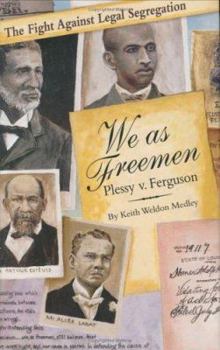We as Freemen: Plessy V. Ferguson
Select Format
Select Condition 
Book Overview
Essential reading on segregation. In June 1892, a thirty-year-old shoemaker named Homer Plessy bought a first-class railway ticket from his native New Orleans to Covington, north of Lake... This description may be from another edition of this product.
Format:Hardcover
Language:English
ISBN:1589801202
ISBN13:9781589801202
Release Date:April 2003
Publisher:Pelican Publishing Company
Length:256 Pages
Weight:1.05 lbs.
Dimensions:1.0" x 5.6" x 8.9"
Customer Reviews
5 ratings
VERY SURPRISED!!
Published by Thriftbooks.com User , 16 years ago
I was surprised that this item was once owned by a library, I hope it wasn't a book that someone forgot to return. Other than that it is a very interesting book.
We as Freemen
Published by Thriftbooks.com User , 19 years ago
We as Freemen describes details and history of Plessy vs. Ferguson that my history books had overlooked,,,and I was an American history student in college. We as Freemen is an effective lesson in race relations, legal history, Supreme Court history, Reconstruction history. The reader knows the outcome of Plessy vs. Ferguson case, but the book reads with a compelling story up to the fateful decision. The characters don't know what will happen, and Mr. Medley describes the Supreme Court changes that they must consider,,,you almost forget the historical outcome and keep reading to find out what happened. A scholarly read that I recommend to anyone who enjoys history or period books. With the pending changes at Supreme Court right now,,,this is surprisingly relevant right now.
A dramatic story rescued from what historians forgot
Published by Thriftbooks.com User , 21 years ago
Long before Rosa Parks refused the disrespectful order to go to the back of the bus in Montgomery, Alabama, came Homer Plessy, the young shoemaker who knew he'd be arrested for refusing to leave the "whites only" car on the New Orleans railroad. He refused to go to the segregated car in order to make the point that the law was cruel and unjust. A federal case was made of it, and in the end, the US Supreme Court made segregation the law of the land for the next 53 years. The high court ruled that "separate but equal" was fair and equitable but history has proven there was nothing fair nor equal about that decision. History also proves there was no justice in that high court opinion and no wisdom or sense of human rights residing with the Justices who issued it.In "We as Freemen," Keith Medley uncovers the rich and intriguing history of the personalities who fought for equality 30 years after the Civil war ended, but generations before U.S. rulers ended legal discrimination based on skin color. In carefully crafted prose, the author is apparently the first researcher to explore the character, mores and lives of the long forgotten men of the Comité des Citoyen (Committee of Citizens) who planned and carried out the peaceful challenge to Louisiana's Separate Car Act of 1890. Homer Plessy did not suddenly challenge segregation. In a story well-told, Medley turned up primary research found in dusty nooks and crannies, and church, library and cemetery logs around New Orleans, which is his hometown. He describes the efforts of businessmen, lawyers, educators, and artisans to stop segregation from taking hold in the South. They conducted their campaign while the forces of reaction were regaining political control after the Civil War. The Comité aimed "to obtain a United States Supreme Court ruling preventing states from abolishing the suffrage and equal access gains of the Reconstruction period that followed the Civil War."Medley manages to summon Homer Plessy from the obscurity Jeremy Irons identifies in his "A People's History of the Supreme Court" (Penguin: 1999) with new research that portrays Plessy as a quiet, hardworking man anxious not to be treated disrespectfully because of his heritage and skin color.Like the U.S. Supreme Court's 1857 Dred Scott decision, which barred slaves and their descendants from citizenship, the high court's decision in Plessy vs. Ferguson was demeaning and hurtful to millions of people. The high court decision in Plessy divided the population, causing widespread suffering. For this reason, it is useful to recall the dark side of Supreme Court history and to appreciate that the Justices are, for better or worse, political appointees who often press their own viewpoints, which tend also to represent the narrow views of the class of politicians who appoint them. Or as Irons put the Plessy decision in context, amid growing strife "the Court remained a bastion of conservatism, earning this banquet toast from a New York banker
A Roadmap for change
Published by Thriftbooks.com User , 21 years ago
"We As Freemen" is a book that reminds us that the names impressed on our court cases were people with professions, families and all of the messy problems of ordinary life. The author draws on original documentation to illustrate the pains of the free and newly free Black populace as they watched their liberties curtailed or removed entirely. It was interesting to read the precise legal choices of the Comite des Citoyens as they moved to ensure that the charges against Plessy be properly drawn (This was reminiscent of Taylor Branch's "Parting the Waters"). The text is clear and dramatic. It could easily serve both as a warning of how freedom is lost and as encouragement for anyone seeking a roadmap for change.
The Story Behind Plessy vs. Ferguson is Finally Told
Published by Thriftbooks.com User , 21 years ago
We as Freemen captures the imagination of the reader from its wonderfully illustrated cover to the very end; and it just won't let go. Keith Medley reveals a great deal about the people, organizations,strategies and tactics behind Plessy vs.Ferguson. Well-written. Well-documented. Well done!





